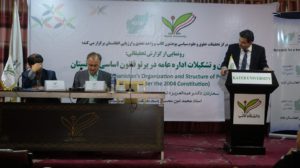The unveiling ceremony of the research report entitled “Study of the Organization and Structure of the Public Administration of Afghanistan in the Light of the Constitution of 1382” was held by the Center Research of Law and Political Science of Kateb University today in the conference hall of the Master’s Branch of university. The study, conducted by the Afghanistan Research and Evaluation Unit (AREU), and faced “Is there a sufficient and appropriate legal framework for the Public Administration Organization in the Afghan Constitution?” question.
The program, which began with a short speech by the Chancellor of Kateb University and the head of the Afghanistan Research and Evaluation Unit, continued by one of its two researchers’ founding, Mirwais Ayoubi, a professor at Herat University and a PhD candidate in public law from the German University of Administrative Sciences. Mentioning some of the fundamental questions that should be raised for the drafters of any constitution, the researcher said that the clear answer to them is the key to entering a comprehensive and efficient constitution. Mr. Ayoubi then described his research method and the evolution of regulations and laws in the history of Afghanistan from Abdul Rahman Khan to the present day as an introductory. Referring to the characteristics of public administration laws in different periods, he pointed out that the drafting of the law in Afghanistan depends either on the previous clause and tradition or on the model of European countries. He blamed political instability for a lack of focus on administrative reform in Afghanistan. The professor of Herat University described the unparalleled public culture, political culture and tribal structure as the cause of the persistence of tyranny as the greatest obstacle to development and stressed that change in public administration depends on the transformation of the system towards democracy.
Researcher of the Research and Evaluation Unit, while pointing out that the most common critique of the current constitution is its intense centralist approach, addressed the effects of decentralization on the country’s resource management. Referring to his research, Mr. Ayoubi emphasized that a large part of the problem lies in the fact that the approach of the Constitution is hypocritical, but the law of public administration is parliamentary. He cited local elected institutions in the constitution, such as Municipality, Municipal Council, and Provincial Council, as opposed to designated bodies such as the local government (the administration that president created). Mr. Ayoubi while mentioning that the selection of ministers is based on political goals, he called for the creation of high-level councils such as the Supreme Economic Council etc. to focus on decision-making in one center and bypassing the role of parliament.
The last part of the ceremony continued with the critique of the professors of the Faculty of Law and Political Science of Kateb, Dr. Abdolaziz Danesh and Professor Mohammad Amin Mohseni Researcher of AREU in the panel. Both professors, in addition to the structural critiques and content they had, considered the whole of this research valuable and methodical.

unveiling-ceremony
Comment is not allowed